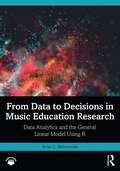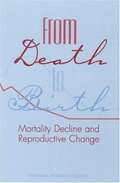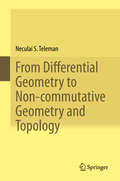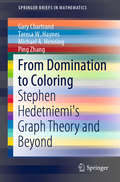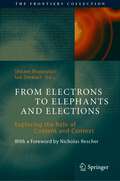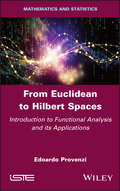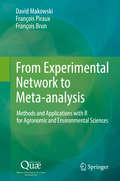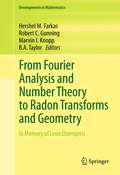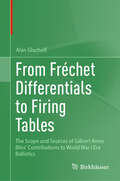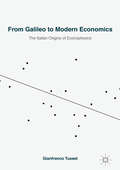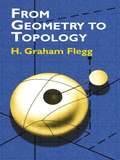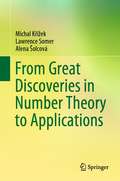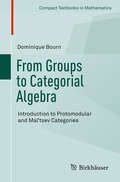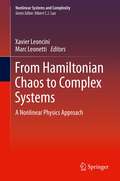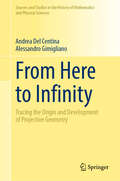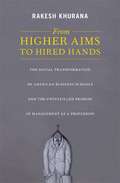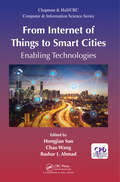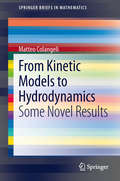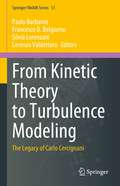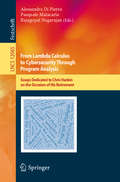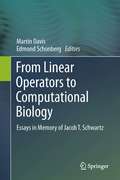- Table View
- List View
From Data to Decisions in Music Education Research: Data Analytics and the General Linear Model Using R
by Brian C. WesolowskiFrom Data to Decisions in Music Education Research provides a structured and hands-on approach to working with empirical data in the context of music education research. Using step-by-step tutorials with in-depth examples of music education data, this book draws upon concepts in data science and statistics to provide a comprehensive framework for working with a variety of data and solving data-driven problems.All of the skills presented here use the R programming language, a free, open-source statistical computing and graphics environment. Using R enables readers to refine their computational thinking abilities and data literacy skills while facilitating reproducibility, replication, and transparency of data analysis in the field. The book offers: A clear and comprehensive framework for thinking about data analysis processes in a music education context. An overview of common data structures and data types used in statistical programming and data analytics. Techniques for cleaning, preprocessing, manipulating, aggregating, and mining data in ways that facilitate organization and interpretation. Methods for summarizing and visualizing data to help identify structures, patterns, and trends within data sets. Detailed applications of descriptive, diagnostic, and predictive analytics processes. Step-by-step code for all concepts and analyses. Direct access to all data sets and R script files through the accompanying eResource. From Data to Decisions in Music Education Research offers a reference "cookbook" of code and programming recipes written with the graduate music education student in mind and breaks down data analysis processes and skills in an approachable fashion. It can be used across a wide range of graduate music education courses that rely on the application of empirical data analyses and will be useful to all music education scholars and professionals seeking to enhance their use of quantitative data.
From Death to Birth: Mortality Decline and Reproductive Change
by Committee on PopulationThe last 35 years or so have witnessed a dramatic shift in the demography of many developing countries. Before 1960, there were substantial improvements in life expectancy, but fertility declines were very rare. Few people used modern contraceptives, and couples had large families. Since 1960, however, fertility rates have fallen in virtually every major geographic region of the world, for almost all political, social, and economic groups. What factors are responsible for the sharp decline in fertility? What role do child survival programs or family programs play in fertility declines? Casual observation suggests that a decline in infant and child mortality is the most important cause, but there is surprisingly little hard evidence for this conclusion. The papers in this volume explore the theoretical, methodological, and empirical dimensions of the fertility-mortality relationship. It includes several detailed case studies based on contemporary data from developing countries and on historical data from Europe and the United States.
From Differential Geometry to Non-commutative Geometry and Topology
by Neculai S. TelemanThis book aims to provide a friendly introduction to non-commutative geometry. It studies index theory from a classical differential geometry perspective up to the point where classical differential geometry methods become insufficient. It then presents non-commutative geometry as a natural continuation of classical differential geometry. It thereby aims to provide a natural link between classical differential geometry and non-commutative geometry. The book shows that the index formula is a topological statement, and ends with non-commutative topology.
From Domination to Coloring: Stephen Hedetniemi's Graph Theory and Beyond (SpringerBriefs in Mathematics)
by Ping Zhang Gary Chartrand Michael A. Henning Teresa W. HaynesThis book is in honor of the 80th birthday of Stephen Hedetniemi. It describes advanced material in graph theory in the areas of domination, coloring, spanning cycles and circuits, and distance that grew out of research topics investigated by Stephen Hedetniemi. The purpose of this book is to provide background and principal results on these topics, along with same related problems and conjectures, for researchers in these areas. The most important features deal with material, results, and problems that researchers may not be aware of but may find of interest. Each chapter contains results, methods and information that will give readers the necessary background to investigate each topic in more detail.
From Electrons to Elephants and Elections: Exploring the Role of Content and Context (The Frontiers Collection)
by Ian Stewart Shyam WuppuluriThis highly interdisciplinary book, covering more than six fields, from philosophy and sciences all the way up to the humanities and with contributions from eminent authors, addresses the interplay between content and context, reductionism and holism and their meeting point: the notion of emergence. Much of today’s science is reductionist (bottom-up); in other words, behaviour on one level is explained by reducing it to components on a lower level. Chemistry is reduced to atoms, ecosystems are explained in terms of DNA and proteins, etc. This approach fails quickly since we can’t cannot extrapolate to the properties of atoms solely from Schrödinger's equation, nor figure out protein folding from an amino acid sequence or obtain the phenotype of an organism from its genotype. An alternative approach to this is holism (top-down). Consider an ecosystem or an organism as a whole: seek patterns on the same scale. Model a galaxy not as 400 billion-point masses (stars) but as an object in its own right with its own properties (spiral, elliptic). Or a hurricane as a structured form of moist air and water vapour. Reductionism is largely about content, whereas holistic models are more attuned to context. Reductionism (content) and holism (context) are not opposing philosophies — in fact, they work best in tandem. Join us on a journey to understand the multifaceted dialectic concerning this duo and how they shape the foundations of sciences and humanities, our thoughts and, the very nature of reality itself.
From Euclidean to Hilbert Spaces: Introduction to Functional Analysis and its Applications
by Edoardo ProvenziFrom Euclidian to Hilbert Spaces analyzes the transition from finite dimensional Euclidian spaces to infinite-dimensional Hilbert spaces, a notion that can sometimes be difficult for non-specialists to grasp. The focus is on the parallels and differences between the properties of the finite and infinite dimensions, noting the fundamental importance of coherence between the algebraic and topological structure, which makes Hilbert spaces the infinite-dimensional objects most closely related to Euclidian spaces.The common thread of this book is the Fourier transform, which is examined starting from the discrete Fourier transform (DFT), along with its applications in signal and image processing, passing through the Fourier series and finishing with the use of the Fourier transform to solve differential equations.The geometric structure of Hilbert spaces and the most significant properties of bounded linear operators in these spaces are also covered extensively. The theorems are presented with detailed proofs as well as meticulously explained exercises and solutions, with the aim of illustrating the variety of applications of the theoretical results.
From Experimental Network to Meta-analysis: Methods and Applications with R for Agronomic and Environmental Sciences
by David Makowski François Piraux François BrunThis book has been designed as a methodological guide and shows the interests and limitations of different statistical methods to analyze data from experimental networks and to perform meta-analyses. It is intended for engineers, students and researchers involved in data analysis in agronomy and environmental science.
From Fourier Analysis and Number Theory to Radon Transforms and Geometry
by Hershel M. Farkas Robert C. Gunning Marvin I. Knopp B. A. TaylorA memorial conference for Leon Ehrenpreis was held at Temple University, November 15-16, 2010. In the spirit of Ehrenpreis's contribution to mathematics, the papers in this volume, written by prominent mathematicians, represent the wide breadth of subjects that Ehrenpreis traversed in his career, including partial differential equations, combinatorics, number theory, complex analysis and a bit of applied mathematics. With the exception of one survey article, the papers in this volume are all new results in the various fields in which Ehrenpreis worked . There are papers in pure analysis, papers in number theory, papers in what may be called applied mathematics such as population biology and parallel refractors and papers in partial differential equations. The mature mathematician will find new mathematics and the advanced graduate student will find many new ideas to explore. A biographical sketch of Leon Ehrenpreis by his daughter, a professional journalist, enhances the memorial tribute and gives the reader a glimpse into the life and career of a great mathematician.
From Fourier Analysis to Wavelets
by Jonas Gomes Luiz VelhoThis text introduces the basic concepts of function spaces and operators, both from the continuous and discrete viewpoints. Fourier and Window Fourier Transforms are introduced and used as a guide to arrive at the concept of Wavelet transform. The fundamental aspects of multiresolution representation, and its importance to function discretization and to the construction of wavelets is also discussed. Emphasis is given on ideas and intuition, avoiding the heavy computations which are usually involved in the study of wavelets. Readers should have a basic knowledge of linear algebra, calculus, and some familiarity with complex analysis. Basic knowledge of signal and image processing is desirable. This text originated from a set of notes in Portuguese that the authors wrote for a wavelet course on the Brazilian Mathematical Colloquium in 1997 at IMPA, Rio de Janeiro.
From Frechet Differentials to Firing Tables: The Scope and Sources of Gilbert Ames Bliss' Contributions to World War I Era Ballistics
by Alan GluchoffThis monograph explores the history of the contribution to ballistics by the American mathematician Gilbert Ames Bliss during World War I. Drawing on the then-evolving calculus of variations, Bliss pioneered a novel technique for solving the problem of differential variations in ballistic trajectory. Called Bliss’ adjoint method, this technique was both hailed and criticized at the time: it was seen as both a triumphant application of pure mathematics to an applied problem and as a complex intrusion of higher mathematics into the jobs of military personnel not particularly interested in these matters. Although he received much praise immediately after the War, the details of Bliss’ work, its furthering of pure mathematical thought, and its absorption into mainstream ballistic work and instruction have never been adequately examined. Gluchoff explores the mathematics of Bliss’ work and the strands from which his technique was developed. He then documents the efforts to make the adjoint method accessible to military officers and the conflicts that emerged as a result both between mathematicians and officers and among mathematicians themselves. The eventual absorption of the adjoint method into range firing table construction is considered by looking at later technical books which incorporate it, and, finally, its influence on the ongoing development of functional calculus is detailed. From Frechet Differentials to Firing Tables will appeal to historians of mathematics, physics, engineering, and warfare, as well as current researchers, professors, and students in these areas.
From Frege to Godel: A Source Book in Mathematical Logic, 1879-1931
by Jean Van HeijenoortThe fundamental texts of the great classical period in modern logic, some of them never before available in English translation, are here gathered together for the first time. Modern logic, heralded by Leibniz, may be said to have been initiated by Boole, De Morgan, and Jevons, but it was the publication in 1879 of Gottlob Frege’s Begriffsschrift that opened a great epoch in the history of logic by presenting, in full-fledged form, the propositional calculus and quantification theory. <p><p> Frege’s book, translated in its entirety, begins the present volume. The emergence of two new fields, set theory and foundations of mathematics, on the borders of logic, mathematics, and philosophy, is depicted by the texts that follow. Peano and Dedekind illustrate the trend that led to Principia Mathematica. Burali-Forti, Cantor, Russell, Richard, and König mark the appearance of the modern paradoxes. Hilbert, Russell, and Zermelo show various ways of overcoming these paradoxes and initiate, respectively, proof theory, the theory of types, and axiomatic set theory. Skolem generalizes Löwenheim’s theorem, and he and Fraenkel amend Zermelo’s axiomatization of set theory, while von Neumann offers a somewhat different system. The controversy between Hubert and Brouwer during the twenties is presented in papers of theirs and in others by Weyl, Bernays, Ackermann, and Kolmogorov. The volume concludes with papers by Herbrand and by Gödel, including the latter’s famous incompleteness paper. <p> Of the forty-five contributions here collected all but five are presented in extenso. Those not originally written in English have been translated with exemplary care and exactness; the translators are themselves mathematical logicians as well as skilled interpreters of sometimes obscure texts. Each paper is introduced by a note that sets it in perspective, explains its importance, and points out difficulties in interpretation. Editorial comments and footnotes are interpolated where needed, and an extensive bibliography is included.
From Galileo to Modern Economics: The Italian Origins of Econophysics
by Gianfranco TussetEmpirical laws are rare in economics. This book describes efforts to anchor economic knowledge to invariant empirical laws. It links 17th and 18th century Galilean monetary economists to econophysics, a field that emerged in the mid-1990s. This virtual journey from past to present is charted by episodes on aggregates and empirical primacy. It includes the virtually unknown story of 19th century scholars who, by searching for a stricter mathematical approach, paved the way to an ‘engineering’ view of economics. Then there are celebrities like Pareto and his first empirical law governing the distribution of wealth. Pareto and Amoroso sparked a debate on the skewed distribution that spanned decades, ranging from finance to market transformations, to econophysics, with its concepts and tools inherited from statistical physics. The last stage of the journey goes through econophysics and the recent gradual advances it has made, which show how its position vis-à-vis economics has been changing.
From Generation to Generation: The Health and Well-Being of Children in Immigrant Families
by Committee on the Health Adjustment of Immigrant FamiliesImmigrant children and youth are the fastest growing segment of the U.S. population, and so their prospects bear heavily on the well-being of the country. However, relevant public policy is shaped less by informed discussion than by politicized contention over welfare reform and immigration limits.From Generation to Generation explores what we know about the development of white, black, Hispanic, and Asian children and youth from numerous countries of origin. Describing the status of immigrant children and youth as "severely understudied," the committee both draws on and supplements existing research to characterize the current status and outlook of immigrant children.The book discusses the many factors--family size, fluency in English, parent employment, acculturation, delivery of health and social services, and public policies--that shape the outlook for the lives of these children and youth. The committee makes recommendations for improved research and data collection designed to advance knowledge about these children and, as a result, their visibility in current policy debates.
From Geometry to Topology (Dover Books on Mathematics)
by H. Graham FleggThis excellent introduction to topology eases first-year math students and general readers into the subject by surveying its concepts in a descriptive and intuitive way, attempting to build a bridge from the familiar concepts of geometry to the formalized study of topology. The first three chapters focus on congruence classes defined by transformations in real Euclidean space. As the number of permitted transformations increases, these classes become larger, and their common topological properties become intuitively clear. Chapters 4-12 give a largely intuitive presentation of selected topics. In the remaining five chapters, the author moves to a more conventional presentation of continuity, sets, functions, metric spaces, and topological spaces. Exercises and Problems. 101 black-and-white illustrations. 1974 edition.
From Great Discoveries in Number Theory to Applications
by Michal Křížek Lawrence Somer Alena ŠolcováThis book provides an overview of many interesting properties of natural numbers, demonstrating their applications in areas such as cryptography, geometry, astronomy, mechanics, computer science, and recreational mathematics. In particular, it presents the main ideas of error-detecting and error-correcting codes, digital signatures, hashing functions, generators of pseudorandom numbers, and the RSA method based on large prime numbers. A diverse array of topics is covered, from the properties and applications of prime numbers, some surprising connections between number theory and graph theory, pseudoprimes, Fibonacci and Lucas numbers, and the construction of Magic and Latin squares, to the mathematics behind Prague’s astronomical clock. Introducing a general mathematical audience to some of the basic ideas and algebraic methods connected with various types of natural numbers, the book will provide invaluable reading for amateurs and professionals alike.
From Groups to Categorial Algebra
by Dominique A. BournThis book gives a thorough and entirely self-contained, in-depth introduction to a specific approach to group theory, in a large sense of that word. The focus lie on the relationships which a group may have with other groups, via "universal properties", a view on that group "from the outside". This method of categorical algebra, is actually not limited to the study of groups alone, but applies equally well to other similar categories of algebraic objects. By introducing protomodular categories and Mal'tsev categories, which form a larger class, the structural properties of the category Gp of groups, show how they emerge from four very basic observations about the algebraic litteral calculus and how, studied for themselves at the conceptual categorical level, they lead to the main striking features of the category Gp of groups. Hardly any previous knowledge of category theory is assumed, and just a little experience with standard algebraic structures such as groups and monoids. Examples and exercises help understanding the basic definitions and results throughout the text.
From Hamiltonian Chaos to Complex Systems: A Nonlinear Physics Approach
by Xavier Leoncini Marc LeonettiFrom Hamiltonian Chaos to Complex Systems: A Nonlinear Physics Approach collects contributions on recent developments in non-linear dynamics and statistical physics with an emphasis on complex systems. This book provides a wide range of state-of-the-art research in these fields. The unifying aspect of this book is demonstration of how similar tools coming from dynamical systems, nonlinear physics, and statistical dynamics can lead to a large panorama of research in various fields of physics and beyond, most notably with the perspective of application in complex systems.
From Here to Infinity: Tracing the Origin and Development of Projective Geometry (Sources and Studies in the History of Mathematics and Physical Sciences)
by Andrea Del Centina Alessandro GimiglianoThis monograph traces the development of projective geometry from its Greek origins to the early 20th century. It covers Renaissance perspective studies and insights from the late sixteenth to seventeenth centuries, examining the contributions of Desargues and Pascal. Most of the book is devoted to the evolution of the subject in the 19th century, from Carnot to von Staudt. In particular, the book offers an unusually thorough appreciation of Brianchon's work, a detailed study of Poncelet's innovations, and a remarkable account of the contributions of Möbius and Plücker. It also addresses the difficult question of the historical relationship between synthetic and analytic points of view in geometry, analyzing the work of prominent synthetic geometers Steiner, Chasles, and von Staudt in detail. The book concludes around 1930, after the synthetic point of view was axiomatized and the analytic point of view became intertwined with algebraic geometry. Balancing historical analysis with technical precision and providing deep insights into the evolution of the mathematics, this richly illustrated book serves as a central reference on the history of projective geometry.
From Higher Aims to Hired Hands: The Social Transformation of American Business Schools and the Unfulfilled Promise of Management as a Profession
by Rakesh Khurana"I have been waiting for years for someone to write the definitive institutional history of U. S. management education, and this is it. From the standpoint of most analytic definitions of 'professional,'the term 'professional manager' is enigmatic, even oxymoronic. Rakesh Khurana's thorough, insightful, provocative, and courageous history of business education explains how this term came to make practical and cultural sense to a generation of Americans, and how its logic has been undermined in the past thirty years. "From Higher Aims to Hired Hands" is an exemplary work of institutional analysis, combining first-rate historiography with outstanding social-science scholarship. It will be essential reading for business historians, students of management and organizations, and faculty, administrators, and thoughtful students at America's business schools. "--Paul DiMaggio, Princeton University" "From Higher Aims to Hired Hands" is a tour de force. With profound depth and sweeping scope, Rakesh Khurana analyses the rise and potential fall of a uniquely American institution--one that has influenced management education throughout the world. His book contributes significantly to explaining how managerial capitalism could go awry and how to restore the moral underpinnings that would make management the profession of leadership. In addition to offering fascinating history lessons based on exhaustive research, Khurana adds new twists to institutional theory and points to future directions for educational practice. "--Rosabeth Moss Kanter, Harvard Business School, author of "The Change Masters, Confidence," and "America the Principled: 6 Opportunities for Becoming a Can-Do Nation OnceAgain" "This panoramic portrait of the origins and ramifications of American business education is quite remarkable, rich in detail, powerful in the marshaling of evidence, and provocative in its claims. Khurana writes with confidence, authority, and erudition. "--Walter Powell, Stanford University "This is a wonderful and important book for anyone interested in business education. There is a tendency for those of us involved in business education to think that we understand the dynamics of our industry and that there is little new that we can learn. How wrong such a judgment would be. In providing a sociological understanding of the origins of business education and the professionalization of management, this book prompts deep reflection about the state of management today and offers real insight into the challenges of elevating the standards of this particular profession. "--Joel Podolny, dean of Yale School of Management
From Higher Aims to Hired Hands: The Social Transformation of American Business Schools and the Unfulfilled Promise of Management as a Profession
by Rakesh KhuranaIs management a profession? Should it be? Can it be? This major work of social and intellectual history reveals how such questions have driven business education and shaped American management and society for more than a century. The book is also a call for reform. Rakesh Khurana shows that university-based business schools were founded to train a professional class of managers in the mold of doctors and lawyers but have effectively retreated from that goal, leaving a gaping moral hole at the center of business education and perhaps in management itself. Khurana begins in the late nineteenth century, when members of an emerging managerial elite, seeking social status to match the wealth and power they had accrued, began working with major universities to establish graduate business education programs paralleling those for medicine and law. Constituting business as a profession, however, required codifying the knowledge relevant for practitioners and developing enforceable standards of conduct. Khurana, drawing on a rich set of archival material from business schools, foundations, and academic associations, traces how business educators confronted these challenges with varying strategies during the Progressive era and the Depression, the postwar boom years, and recent decades of freewheeling capitalism. Today, Khurana argues, business schools have largely capitulated in the battle for professionalism and have become merely purveyors of a product, the MBA, with students treated as consumers. Professional and moral ideals that once animated and inspired business schools have been conquered by a perspective that managers are merely agents of shareholders, beholden only to the cause of share profits. According to Khurana, we should not thus be surprised at the rise of corporate malfeasance. The time has come, he concludes, to rejuvenate intellectually and morally the training of our future business leaders.
From Internet of Things to Smart Cities: Enabling Technologies (Chapman & Hall/CRC Computer and Information Science Series)
by Chao Wang Hongjian Sun Bashar AhmadFrom Internet of Things to Smart Cities: Enabling Technologies explores the information and communication technologies (ICT) needed to enable real-time responses to current environmental, technological, societal, and economic challenges. ICT technologies can be utilized to help with reducing carbon emissions, improving resource utilization efficiency, promoting active engagement of citizens, and more. This book aims to introduce the latest ICT technologies and to promote international collaborations across the scientific community, and eventually, the general public. It consists of three tightly coupled parts. The first part explores the involvement of enabling technologies from basic machine-to-machine communications to Internet of Things technologies. The second part of the book focuses on state of the art data analytics and security techniques, and the last part of the book discusses the design of human-machine interfaces, including smart home and cities. Features Provides an extended literature review of relevant technologies, in addition to detailed comparison diagrams, making new readers be easier to grasp fundamental and wide knowledge Contains the most recent research results in the field of communications, signal processing and computing sciences for facilitating smart homes, buildings, and cities Includes future research directions in Internet of Things, smart homes, smart buildings, smart grid, and smart cities Presents real examples of applying these enabling technologies to smart homes, transportation systems and cities With contributions from leading experts, the book follows an easy structure that not only presents timely research topics in-depth, but also integrates them into real world applications to help readers to better understand them.
From Kinetic Models to Hydrodynamics
by Matteo ColangeliFrom Kinetic Models to Hydrodynamics serves as an introduction to the asymptotic methods necessary to obtain hydrodynamic equations from a fundamental description using kinetic theory models and the Boltzmann equation. The work is a survey of an active research area, which aims to bridge time and length scales from the particle-like description inherent in Boltzmann equation theory to a fully established "continuum" approach typical of macroscopic laws of physics.The author sheds light on a new method--using invariant manifolds--which addresses a functional equation for the nonequilibrium single-particle distribution function. This method allows one to find exact and thermodynamically consistent expressions for: hydrodynamic modes; transport coefficient expressions for hydrodynamic modes; and transport coefficients of a fluid beyond the traditional hydrodynamic limit. The invariant manifold method paves the way to establish a needed bridge between Boltzmann equation theory and a particle-based theory of hydrodynamics. Finally, the author explores the ambitious and longstanding task of obtaining hydrodynamic constitutive equations from their kinetic counterparts. The work is intended for specialists in kinetic theory--or more generally statistical mechanics--and will provide a bridge between a physical and mathematical approach to solve real-world problems.
From Kinetic Theory to Turbulence Modeling: The Legacy of Carlo Cercignani (Springer INdAM Series #51)
by Paolo Barbante Francesco D. Belgiorno Silvia Lorenzani Lorenzo ValdettaroThe book collects relevant contributions presented at a conference, organized in honour of Carlo Cercignani, that took place at Politecnico di Milano on May 24–28, 2021. Different research areas characterizing the scientific work of Carlo Cercignani have been considered with a particular focus on: mathematical and numerical methods for kinetic equations; kinetic modelling of gas mixtures and polyatomic gases; applications of the Boltzmann equation to electron transport, social phenomena and epidemic spread; turbulence modelling; the Einstein Classical Program; Dynamical Systems Theory.
From Lambda Calculus to Cybersecurity Through Program Analysis: Essays Dedicated to Chris Hankin on the Occasion of His Retirement (Lecture Notes in Computer Science #12065)
by Alessandra Di Pierro Pasquale Malacaria Rajagopal NagarajanThis Festschrift is in honor of Chris Hankin, Professor at the Imperial College in London, UK, on the Occasion of His 65th Birthday.Chris Hankin is a Fellow of the Institute for Security Science and Technology and a Professor of Computing Science.His research is in cyber security, data analytics and semantics-based program analysis. He leads multidisciplinary projects focused on developing advanced visual analytics and providing better decision support to defend against cyber attacks. This Festschrift is a collection of scientific contributions related to the topics that have marked the research career of Professor Chris Hankin. The contributions have been written to honour Chris' career and on the occasion of his retirement.
From Linear Operators to Computational Biology
by Martin Davis Edmond SchonbergIn his rich and varied career as a mathematician, computer scientist, and educator, Jacob T. Schwartz wrote seminal works in analysis, mathematical economics, programming languages, algorithmics, and computational geometry. In this volume of essays, his friends, students, and collaborators at the Courant Institute of Mathematical Sciences present recent results in some of the fields that Schwartz explored: quantum theory, the theory and practice of programming, program correctness and decision procedures, dextrous manipulation in Robotics, motion planning, and genomics. In addition to presenting recent results in these fields, these essays illuminate the astonishingly productive trajectory of a brilliant and original scientist and thinker.
